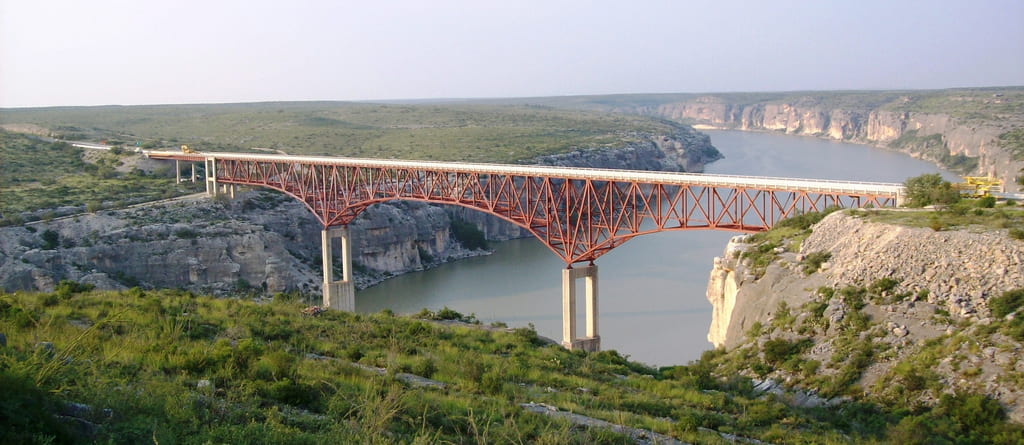Mike Gershon, Chairman of 18-lawyer Water Practice Group, Lloyd Gosselink, P.C. Mike is also General Counsel for the Texas Water Journal.
Texas v. New Mexico
(decided by U.S. Supreme Court on Dec. 14, 2020)

Pecos Bridge – credit: mlhradio, Flickr
At issue: Whether New Mexico is responsible for evaporation losses when storing and accounting for water earmarked for Texas under the Pecos River Compact.
Held: Texas loses 21,000 acre-feet of rights in the Pecos River to evaporation when Texas requests that its water be stored temporarily in a New Mexico reservoir.
Background: Ironically, Texas sought relief from excessive rainfall and likely flooding in the Pecos River Basin caused by Tropical Storm Odile in the fall of 2014. At Texas’s request, New Mexico held back Texas’s water allocation in Brantley Lake until floodwaters subsided and Texas was willing to take the water during summer 2015. By that time, 21,000 acre-feet had evaporated from Brantley Lake in the summer heat of the Chihuahuan Desert. Texas sued complaining that its entitlement should not be reduced by evaporation occurring in New Mexico. The U.S. Supreme Court resolved the dispute by relying on the parties’ intentions and express language of the Pecos River Compact and the River Master’s Manual adopted in related litigation 26 years earlier. The Manual provides that when Texas requests that its water allocation remain in storage in New Mexico, then its allocation “will be reduced by the amount of reservoir losses attributable to its storage.” This case highlights the importance of factoring in weather events, water-allocation methodology, and procedure when negotiating an interstate water compact.
Cockrell Investment Partners, L.P. (Cockrell) v. Middle Pecos Groundwater Conservation District (MPGCD) and its Board President, Fort Stockton Holdings, L.P. (FSH), and Republic Water Co. of Texas, LLC (“Cockrell I”)
(dismissed by state court on Dec. 28, 2020, and appealed on Jan. 19, 2021)
…and companion case Cockrell v. MPGCD and its General Manager, FSH, and Cities of Abilene, Midland and San Angelo (“Cockrell II”)
(claims against cities dismissed by state court on Jan. 8, 2021, and other claims survive jurisdictional hearing held Dec. 17, 2020)
At issue: Whether a groundwater marketer and its municipal partners will face a permit protest from a neighboring pecan farm several years after the initial permit decision or when the permit is automatically renewed.
Held: In Cockrell I, the plaintiff pecan farm is several years too late to protest an application to produce nearly 50,000 acre-feet of groundwater per year and does not have standing to protest an application to reduce an existing groundwater permit held by its neighbor FSH. Cockrell’s claims were dismissed, and are now on appeal. In Cockrell II, the cities of Abilene, Midland and San Angelo that contracted for 28,000+ acre-feet of FSH’s water are immune from the pecan farm’s suit but the court will hear claims challenging the renewal of FSH’s permit.
Background: After several lawsuits in federal and state court between 2010-2017, FSH settles with several protestants and MPGCD in exchange for reducing its groundwater-export volume by more than 40% and accepting unprecedented permit restrictions and a commitment to substantially fund aquifer research. Cockrell challenges the settlement and FSH permit demanding stricter conditions to ensure sufficient local supplies for Cockrell’s operations. Next up in trial court will be the Court’s consideration of whether export-based production permits should be automatically renewed.
Green Valley Special Utility District (GVSUD) v. Public Utility Commission (PUC) and its Commissioners and Executive Director and City of Schertz and its City Manager
(dismissed by federal court on Nov. 23, 2020, after remand from 5th Circuit Court of Appeals; motion for new trial and to alter judgment pending)
At issue: The ability of an existing utility to protect its service area (CCN) from curtailment.
Held: Federal protection of service area of a utility with federal debt only applies if the utility proves that it has (1) adequate facilities to provide service to the area within a reasonable time after a request for service is made and (2) the legal right to provide service. GVSUD’s claim to protect its CCN was dismissed because of PUC’s fact findings that there was “no retail sewer service” and “no physical improvements” in the decertified service area.
Background: This is the first case to apply the 5th Circuit’s new test under 7 U.S.C. § 1926(b), which reversed 24 years of precedent that required only a minimal showing that the indebted utility was lawfully authorized to serve (i.e., by holding a CCN). GVSUD’s motion for new trial and to alter judgment requests an opportunity to demonstrate that it meets the new two-part test. GVSUD points out a nuance in decertification under an encroaching city’s single-certification petition since there has not yet been a request for service to apply the new two-part test.
Join Our Mailing List
Subscribe to Texas+Water and stay updated on the spectrum of Texas water issues including science, policy, and law.

